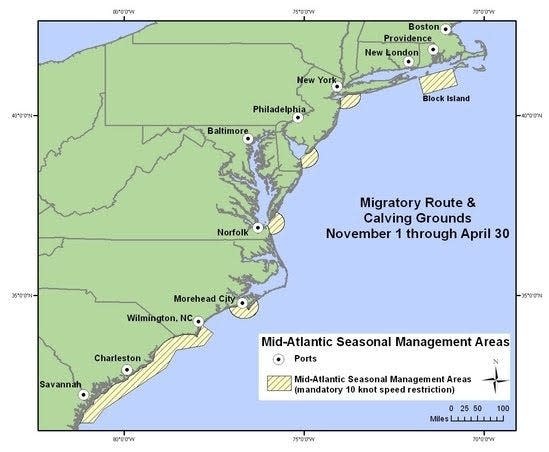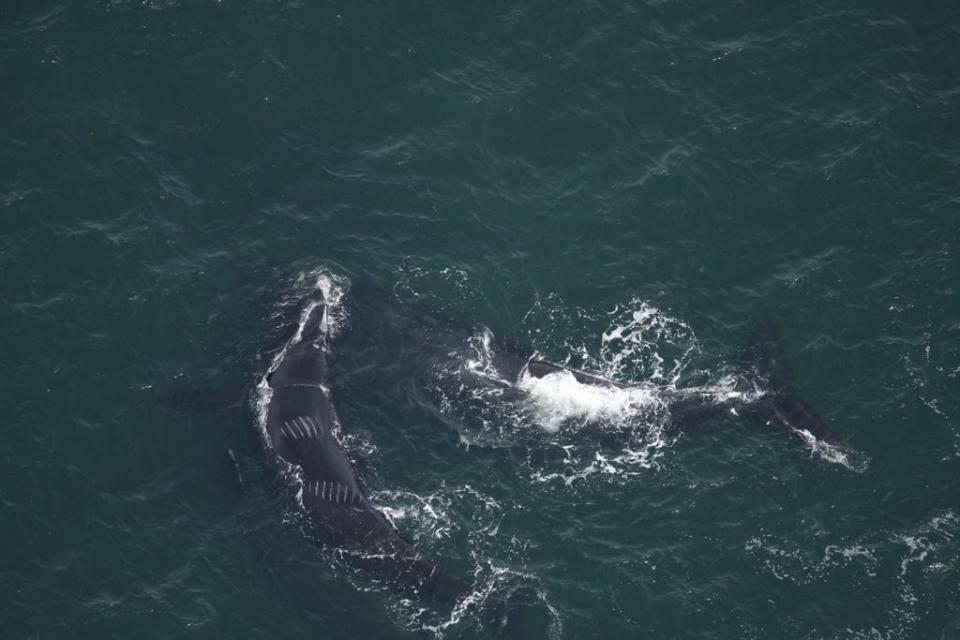Can endangered right whales and charter fishing boats co-exist off the NC coast?

The 2024 hurricane season doesn't officially start for more than a month.
Yet a storm is already raging off the North Carolina coast, and this one involves the future of two of the most iconic symbols of the state's coastal areas − whales and fishing.
But to save one, whether one of the most highly endangered animals in the world or an industry that supports thousands of jobs and is worth millions to coastal communities, must the other go?
"We’re not against species protection at all," said Frank Hugelmeyer, president and CEO of the National Marine Manufacturers Association (NMMA). "But we don’t think you solve one existential problem by creating another one."
'Not dying because of natural causes'
For more than a decade the federal government has instituted seasonal-management areas, or SMAs, to limit the speed of most vessels 65 feet or longer to 10 knots, about 11.5 mph, in areas known to have heavy ship traffic that are also migratory routes or known calving grounds for the highly endangered North Atlantic right whale. The marine mammals, which number fewer than 360 individuals, traverse the near-shore waters along the East Coast as they travel between their winter calving grounds off the U.S. Southeast coast and their summer feeding areas in New England and the Canadian Maritimes.
The idea behind the SMAs was to try and limit the number of interactions between the whales and vessels, with ship strikes − along with entanglements with fishing gear − the leading threats to the animals. The North Atlantic Right Whale Consortium, a group of public and private groups dedicated to the conservation and recovery of the right whale, in late October said new data showed the whale's population at 356 individuals, down from an estimated 483 animals as recently as 2010. Although hunting of the right whales, so named because they swam close to shore and floated when dead, making them easy to kill and drag ashore for processing, has been outlawed for nearly a century, the species has been slow to recover because of their delayed reproduction and the manmade threats in the oceans.
The go-slow zones, which run from November through April, extend about 20 nautical miles, or 23 miles, offshore and include areas around Morehead City and Beaufort and within 23 miles from shore between Wilmington and Brunswick, Ga.
But a flurry of right whale deaths this year, the most recent in late March off Virginia, has researchers and conservation groups saying more needs to be done to protect the animals − with every individual whale, especially breeding females, vital to the species' survival. The death of #1950 off Virginia Beach was the fourth confirmed death of a right whale along the East Coast this year, not including three newborn calves that have not been seen with their mothers. Necropsies determined that three of the deaths were likely due to ship strikes, with the other an entanglement with fishing gear.
Key to saving the species, conservationists say, is the implementation of a draft rule that would expand the go-slow rules more areas of the coast and to include boats as small as 35 feet. The proposed regulation is a result of legal pressure placed on the federal government by conservation groups, frustrated by regulators' not moving quickly enough as whale numbers dwindled, to do more to protect the animals.
"These whales are not dying because of natural causes," said Gib Brogan, fisheries campaign director with the environmental group Oceana, in a statement after the most recent whale death. "They are dying preventable deaths as a result of collisions with boats and entanglements in fishing gear, and our government isn’t doing anything to stop it. How many more deaths must this endangered species face before President Biden takes action?"
According to a NOAA spokesperson, the agency has forwarded the proposed regulation to the White House where it is under review by the Office of Information and Regulatory Affairs, which is part of the Office of Management and Budget (OMB).
GO-SLOW PROPOSAL: Will small boats soon have to slow down off NC to protect endangered right whales?

'Technology is the answer'
But Hugelmeyer with the marine manufacturing association said implementing seasonal speed limits on boats as small as 35 feet would be an "economic catastrophe" for charter boat captains and the coastal communities that rely on the customers the fishermen attract to fill hotels, beach rentals, bars and restaurants throughout the year.
"It would have a big, big impact, and they quite honestly have not done their research," he said, alluding to economic impact figures floated by NOAA that fishing industry groups claim barely scratch the surface of the real financial damage that would be caused if the proposed rule was implemented.
According to the NMMA, implementing the draft rule could put more than 810,000 jobs and nearly $230 billion in economic output into jeopardy. The trade group also notes that more than 95% of boats sold in the U.S. are manufactured domestically, and nearly 93% of boat manufacturers are small-business owners. According to the N.C. Wildlife Resources Commission, there were 345,000 registered boats in North Carolina as of the end of 2023. Of those, nearly 13,500 boats were 26 feet long or bigger.
According to a report by the American Sportfishing Association released in May 2022, the recreational fishing industry in North Carolina supports 455,000 jobs and generates $152 in economic impact for every pound of fish landed.
Hugelmeyer said throwing the threat from small vessels to the whales into the same category as the danger from large ocean-going vessels isn't fair or realistic, noting the higher maneuverability of smaller boats, and would systematically destroy the economies in many coastal areas that are already struggling with declining commercial fishing industries and rising threats from natural disasters.
"You don't have to do a blanket approach across the entire Atlantic to protect this species," he said. "Technology is the answer to this problem."
Hugelmeyer said high-tech answers to help avoid whale-boat interactions could include improved GPS mapping, increased surveillance by drones and aircraft, and tagging the animals − although researchers have said tagging the whales and receiving real-time location information would be financially and operationally challenging.
What groups like NMMA want to see, Hugelmeyer added, is a chance to sit down with NOAA and craft a solution that works for both parties, not one that only has the input of only one side − in this case the environmental community.
"You're creating a consumer-safety issue, a massive economic issue, and a massive political issue," he said, alluding to potential dangers if small boats had to obey the go-slow speed rules during periods of bad weather. "This rule would be devastating for a state like North Carolina."
But environmental groups say the right whale is quickly running out of time, and the last thing the animals need is more bureaucratic foot dragging in the rule-making process.
"I’m horrified but not surprised that the latest dead North Atlantic right whale was killed by a vessel strike. The federal government has absolutely no excuse for delaying a vessel-speed rule while we watch these poor whales pile up,” said Catherine Kilduff, a senior attorney at the Center for Biological Diversity, in a statement. “Every day without action brings right whales closer to extinction. A new speed rule is ready to go out the door, and I’m outraged that federal officials aren’t responding to this clear and deadly threat with a viable solution.”
SLOWING DOWN: Feds delay decision on small boat speed limit rule that could help endangered right whales

'Ready-made for an attack ad'
But the federal government, which initially said it intended to roll out the new rule by the end of 2023, doesn't appear to be in a hurry to act on the proposal.
That's probably not by accident, said Dr. Chris Cooper, director of the Public Policy Institute at Western Carolina University.
He said with the presidential election potentially resting on a knife's edge and North Carolina, Georgia, Virginia and Florida all states that could swing to either party, the Biden administration has to be taking politics into consideration when reviewing whether to adopt the new rule.
"This is definitely where politics meets policy," Cooper said, noting that coastal votes in any of those states could be critical to seeing whether they turn red or blue in November.
With the widespread nature of the proposed new regulation almost "ready-made for an attack ad" that reinforces the government overreach many Americans already feel about Democrats, Cooper said Democratic strategists are likely thinking long and hard about the political fallout if the administration moves forward with the expanded go-slow zones.
"Clearly the political calculation has to be there," he said.
Reporter Gareth McGrath can be reached at GMcGrath@Gannett.com or @GarethMcGrathSN on X/Twitter. This story was produced with financial support from the Green South Foundation and the Prentice Foundation. The USA TODAY Network maintains full editorial control of the work.
This article originally appeared on Wilmington StarNews: Can endangered whales and charter boats co-exist off the NC coast?

